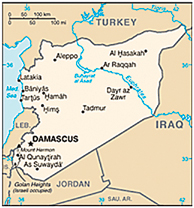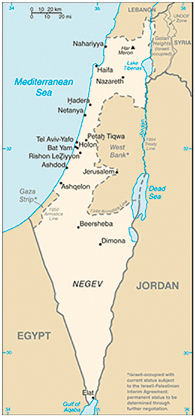It is a darker world today than it was a year ago.
Charlie Allen, Chief Intelligence Office
Department of Homeland Security
This is the conclusion of a series of Mideast updates that began in January. This month we focus on Israel and Syria.
Syria
 Henry Kissinger once observed, “Damascus is at one and the same time the fount of modern Arab nationalism and the exhibit of its frustrations.” He also wrote. “Syrian history alternates achievement with catastrophe.”1 In the Old Testament, Syria (or “Aram”) was the name for the Aramean kingdom centered at Damascus. A country of deep and rich traditions—Greco-Roman, Islamic, and Mediterranean—it had become a cultural and intellectual backwater.
Henry Kissinger once observed, “Damascus is at one and the same time the fount of modern Arab nationalism and the exhibit of its frustrations.” He also wrote. “Syrian history alternates achievement with catastrophe.”1 In the Old Testament, Syria (or “Aram”) was the name for the Aramean kingdom centered at Damascus. A country of deep and rich traditions—Greco-Roman, Islamic, and Mediterranean—it had become a cultural and intellectual backwater.
Founded in 1920 under King Faisal of the Hashemite family, Syria has had a long and colorful history. In the last century, a Lebanese state had arisen on their western border, fostered by the French in 1920, with a large Sunni influence in the government, but always in conflict with the Sunni-dominated government of Syria. Syrian nationalists never reconciled themselves to the triumph of Israel in 1948; the late Syrian President Hafez al-Assad called Israel “Southern Syria.”
Regardless of public pronouncements, Syria knows that the establishment of a Jewish state cannot be reversed, and the Six Day War in 1967 showed that Syria was not Israel’s military equal. Syria then faced a challenge: how to separate the “problem of 1967” (the Golan Heights) from the “problem of 1948” (the bigger question of “Palestine”). They solved the dilemma with the U.S.-orchestrated cease fire of October 1973. They have combined belligerent rhetoric with diplomatic action. They have carried on this dichotomy in other ways with Israel. As a State, they have been low key in their dealings with Israel, but are, at the same time, a known sponsor of terrorism.
Iran and Syria routinely provide protection and resources to terrorist organizations. Syria has also continued to support Hezbollah since the group came into existence, as well as HAMAS, Palestinian Islamic Jihad (PIJ), the Popular Front for the Liberation of Palestine (PLFP), and the Popular Front for the Liberation of Palestine-General Command (PFLP-GC), among others. All have offices in Damascus and operate within Syria’s borders.
While the Syrian government insists that the Damascus-based groups are confined to political and informational activities, Palestinian groups with leaders in Syria have claimed responsibility for anti-Israeli terrorist attacks.
In the last 18 months, Syria has increased their support of terrorists. Israel has also turned Syria and Iran into strange bedfellows. Iran’s ability to mobilize the Shiite community in Lebanon has provided a critical strategic advantage to Syria in efforts to push Israel out of neighboring Lebanese territory, including during the most recent Israeli-Lebanese war of 2006.
Some intelligence analysts have evidence that terrorist groups inside Syria are actively working to acquire nuclear material to use against Israel, which will elicit a military response.
Syrians privately whisper of the inevitability of peace and normalized relations with Israel. Many hope legal trade avenues will open up, along with temporary work opportunities. But such hopes are overshadowed by Syria’s powerful alliance with Iran, a country firmly opposed to any further Arab-Israeli agreements, particularly involving one of its closest historical allies. The costs of endangering this alliance are currently too great for President Bashar al-Assad to absorb, given his state’s international isolation, so he ignores his citizens’ interest in establishing economic relations with the Jewish state.2
Israel
 If you want to know where we are in end time prophecy, watch Israel. Ever since the Regathering in the Land, we can see end-time prophecy unfolding. A “Cup of Trembling,” there have been fourteen major conflicts between Israel and its neighbors since the 1948 United Nations partition.3
If you want to know where we are in end time prophecy, watch Israel. Ever since the Regathering in the Land, we can see end-time prophecy unfolding. A “Cup of Trembling,” there have been fourteen major conflicts between Israel and its neighbors since the 1948 United Nations partition.3
Israel is in the unenviable position of having to win every war to survive. Their enemies don’t have to win any of them, except the last one. From a nuclear standpoint, Israel is a “one-bomb country.” One nuclear device detonated over Israel would devastate the country. This puts Israel in a very bad position. There is no room for error in their foreign policy. They feel if they make one mistake, it is the end of them as a nation, thus giving new meaning to the slogan “Never Again.”
Jerusalem has also become the “burdensome stone” predicted in Zechariah.4 From 1967 to 1989 the UN Security Council passed 131 resolutions directly addressing the Arab-Israeli conflict, all of them against Israel, most vetoed by the United States. In fact, the United States had been Israel’s staunchest partner since May 15, 1948 when President Harry Truman (over the objections of his cabinet and Joint Chiefs of Staff) recognized the State of Israel on May 15, 1948, minutes after Israel declared its independence. Past American presidents, encouraged by active support from civic groups, labor unions, political parties, and members of the American and world Jewish communities, supported the concept, outlined in Britain’s 1917 Balfour Declaration, of a Jewish homeland.
The political landscape has now changed. The Obama administration has distanced itself from Israel in its effort to establish closer ties with the Muslim world. It has also joined the EU to call for a halt to building settlements in occupied territory and for a divided Jerusalem to serve as the capitals of both Israel and Palestine. These two issues serve as indicators for other important issues.
What if Iran exploits America’s eagerness for diplomacy, and uses delaying tactics to “run out the clock” on its nuclear weapons program? The Israelis do not believe that the current negotiations would elicit real Iranian cooperation and do not trust the Turks to mediate the dispute. The more Iran toys with the Turkish proposal to store its enriched uranium, the more the Israelis can protest to the United States behind the scenes that the negotiations will not lead to constructive results, and more aggressive action is needed.
What if President Obama’s diplomatic initiative fails and Iran calls his bluff about nuclear weapons being “unacceptable”? Seeing the President’s performance on the world stage so far, this is entirely possible. If Obama is faced with a choice between a nuclear Iran and using a military option to neutralize the facilities, will the president choose to strike and alienate his political base on the Left as well as the Joint Chiefs of Staff?
The Obama administration’s latest moves, among others, have brought a harsh reality to the Israelis—they are on their own. For this reason, the Israelis have thus been busy running their own diplomatic course apart from the United States and the rest of the P-5+1 group.5
During the Bush administration, one scenario was for Israel to launch a preemptive strike against Iran’s nuclear facilities. Israel does not have the sophisticated weaponry to reach the underground facilities with conventional weapons, so it would have to go nuclear. This would be the United States’ worst nightmare. The thinking in Tel Aviv was that the United States would then step in and conduct the strike itself with the more sophisticated, conventional weapons rather than risk a nuclear confrontation in the region. This scenario was still dangerous, especially if the Russians decided to come to Iran’s defense.
Today, though, Israel believes that the U.S. would not intervene but would “dwell carelessly” while Israel carried out a strike on Iran. The same holds true if Israel decided to strike Damascus. After several incidents where state-sponsored acts of terror were traced back to Syria, Damascus was warned that the city would be “leveled” if there was ever a nuclear attack on Israel. As one source in the Israeli Government said, “If this brings about Isaiah 17, so be it.”
The strategic thinking of the U.S. and Israel has been brought into sharp relief under the Obama administration. The U.S. position on Iran obtaining nuclear weapons is based on two assumptions: 1) If Iran obtains nuclear weapons, they will act responsibly with them (as the Chinese did) and 2) The U.S. is outside the effective range of Iran’s current ballistic missile arsenal, while Israel is not.
Israel is a completely different level of risk than the United States. To Israel, while a direct nuclear strike by Iran on them is improbable; the result on this “one-bomb country” would be catastrophic. To the United States, the risk of an attack is less likely and the results, while very serious, would be less devastating. Thus, the U.S. is willing to play for time, while the Israelis have no such luxury.
Since the new policy of the Obama administration is negotiation and sanctions rather than military action, the entire onus of a military response seems to be on Israel.
In the past, Israel has shown it will not fail to act when faced with an external threat. The Osirak reactor bombing outside Baghdad in 1981 proves the point. New information is coming out that Iran may act against Israel via proxies, such as remnants of the PLO from South Beirut, Shiite proxy groups such as Hezbollah, or the Marxist Kurdistan Workers’ Party, making it unclear where Israel would retaliate.
Not knowing where Iran was most likely to strike Israel and how Israel would respond is a big concern to the United States. While it is thought that Israel now has enough ordinance to destroy Iran’s nuclear facilities if they attack Iran directly, it does not have enough to prevent a retaliatory response by Iran. This response could be the sinking of a transport ship in the Gulf of Hormuz, blocking 27% of the world’s oil from reaching the rest of the globe.6 It could be another, larger Iranian attack on the disputed oil fields in Eastern Iraq, or it could be the seizing of a crew off the coast of Iran.
A response to these kinds of actions would be up to the United States, drawing the nation into another conflict it could ill afford, since a response by the United States would also require a ground component to any operation.
Operation Cobra
Partly to ease Israeli fears of a lack of U.S. support, the United States conducted a joint military exercise with Israel, known as Operation Cobra, the largest bilateral ballistic missile defense operation to date. It was interesting that these exercises were highly publicized, as opposed to other joint operations.
It is supposed that the United States wanted Iran to know precisely what they were doing. If Iran would launch a nuclear missile against Israel it would probably launch only one; they would not wait to develop more and risk that asset being destroyed in a silo.
If the only missile Iran can launch is shot down by an U.S.-Israeli ballistic missile, that would be a worst case scenario for Iran. The United States wants Iran to know they are ready for them.
So for now, as in so many things in the Mideast arena, the Obama administration is following the Bush administration strategy: Make vague threats, gather allies to their point of view (either through the UN or individually), protect the Mideast oil supplies, and play a waiting game. While the U.S. will play a waiting game, Israel is preparing for an offensive battle.
Over the next year, do not pay as much attention to all the rhetoric coming out of that region as to what these countries are actually doing. This is a classic case of actions speaking louder than words.
Notes:
(Ajami, 2009).
(Gifford, 2009).
-
1. 1948 War of Independence —November 1947 - July 1949.
2. The retribution operations—conducted in the 1950s (Military response by Israel for every terror action made by the Fedayeen).
3. The Sinai War—October 1956.
4. Six-Day War—June 1967.
5. War of Attrition—1968-1970 (a limited war fought between the Israeli military and Egypt, the USSR and the PLO to recapture the Sinai from Israel).
6. Yom Kippur War—October 1973.
7. Operation Litani—March 1978 (The 1978 South Lebanon conflict).
8. First Lebanon War—Began June 1982.
9. The fighting in Southern Lebanon—1985 - 2000.
10. The First Intifada—Began in December 1987.
11. The Gulf War (1991)—Israel attacked by Iraqi missiles to provoke a response. 12. The al-Aqsa Intifada—Started in September 2000.
13. Second Lebanon War—Summer 2006.
14. Operation Cast Lead —2008-2009 (IDF strikes in the Gaza Strip in response to rocket attacks).
Zechariah 12:3.
The 5 Permanent Members of the UN Security Council plus Germany.
(Elwart, 2008).
Sources:
Ajami, F. (2009). The Ways of Syria. Foreign Affairs, 50-54.
Berry, J., & Thomas, E. (2009, January 31). Obama’s Vietnam. Retrieved August 20, 2009, from Newsweek: http://www.newsweek.com/id/182650.
Bolton, J. (2009). President Obama’s Foreign Policy: An Assessment. “First Principles on First Fridays” lecture series (pp. 1-3). Washington, DC: Hillsdale College.
Central Intelligence Agency (2009). The World Factbook. Washington, DC: Government Printing Office.
Cooper, H. (2009, November 19). Obama Says He Is Close to Afghan War Decision. Retrieved November 20, 2009, from New York Times: http://www.nytimes.com/2009/11/19/world/asia/19prexy.html.
Elwart, S. (2008). Choke Oil. Coeur d’Alene, ID: Koinonia Institute.
Friedman, G. (2009, August 18). Iraq Endgame. Retrieved November 21, 2009, from Stratfor: http://www.stratfor.com/weekly/20090817_iraq_endgame.
Gifford, L. A. (2009). Syria: The Change That Never Came. Current History , 417-423.
Iran Focus (2005, November 17). European Parliament rips Iran leader’s remarks. Retrieved November 27, 2009, from Iran Focus : http://www.iranfocus.com/en/special-wire/european-parliament-rips-iran-leader-s-remarks-04468.html.
Missler, C. (2002). Roots of War. Coeur d’Alene, ID, USA.
Thomas, G. (2009, December 02). Nuke supplies link Pyongyang to Qom. Retrieved December 02, 2009, from G2 Bulletin: http://g2bulletin.wnd.com/index.php?fa=PAGE.view&pageId=1594.






